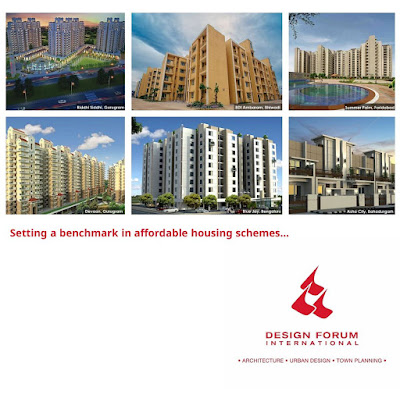Increasing by nearly 100% since the first half of 2016 from
the year-ago period, there is a buzz around the affordable housing segment
after the announcement of slew of rebates on home loans under the Pradhan
Mantri Awas Yojana. However, this sudden augment of the real estate market has
led to a decline of quality homes in the affordable segment.
Design Forum International (DFI) felt the need to solve this
problem looking beyond the buzz word and coming out with a design solution and
setting benchmarks in this domain.
The market potential of affordable housing projects in the country is expected to touch trillions
in a few years and the demand for affordable housing is expected to remain
healthy, emanating to young demographic profile, shift towards nuclear families
and rapid urbanisation.
DFI, being the first architectural firm to get approval
under affordable housing scheme by Haryana Government, has successfully
delivered projects in that region and other states without compromising on
quality and the facilities provided. The projects delivered by DFI were
finished at a cost lower by staggering 15-25% compared to similar developments.
Summer Palms in Faridabad is a fine example of affordable
housing projects by DFI. This project was finished at an average cost of Rs.
1,050 per square foot yet has a thoughtful and efficient landscape design, with
a blend of play and leisure areas, a fully functional and aesthetic club and
sports facilities. DFI takes pride in successfully delivering similar
affordable housing projects across the country such as BDI Ambaram - Bhiwadi,
Paradise 62 - Gurgaon, Blue Jay Housing - Bangalore, Surya Housing - Lucknow,
Vibrant Township - Bahadurgarh and many more.
The influx of professionals to Tier 1 and Tier 2 cities has
increased the demand for affordable homes. Very often, the affordable housing
schemes are equipped with substandard amenities and are designed keeping in
mind the EWS and lower income sections.
They are not designed for the middle working class that
needs quality homes. Affordability is
often misinterpreted in Indian context, this means cost-cutting by developers
that leads to provision of poor level of amenities provided to end user. The
scheme to this should be quality with value for money.
Affordable housing built under the public-private
partnership model is facing limited success in achieving its purpose, i.e.,
reducing the existing urban housing shortage. The major reasons are the
mismatch in demand and supply and location coupled with dwindling quality.
A cost-efficient quality home has all the attributes of a
premium property, but is affordable to a larger segment of the population. The
benefit of affordable housing is in its ability to enable families to have the
opportunity to live in communities close to work, education, and affordable
transportation, while making provision for those most at-risk in our society.
The affordable luxury market is fast expanding its base to include home buyers
from the middle class.
DFI, with their futuristic approach towards architecture and
design, hit on 'Concept Homes'. These homes will allow homeowners to
reconfigure their home as their lifestyle and economic situation changes. Rooms
can change in size and/or a complete floor may change in function. The dwelling
can be reconfigured as the size of the family increases or its needs change.
Foldable furniture can also be brought in to add more space
and functions to a room. This, as they foresee, will bring about a revolution
in the affordable housing market in India.
About Design Forum
International
In the year 1995, three young architecture graduates from
IIT Kharagpur started an architectural practice called Tevatia, Chauhan &
Sharma Architects (TCS). In 2003, the practice was rechristened as Design Forum
International (DFI) headed by three partners Anand Sharma, Anoj Tevatia, and
Goonmeet Chauhan, with a clear intent to foster an egalitarian organizational
ethos where distinctive architectural talent finds self-expression and can
contribute in a democratic and collaborative work environment.
The practice has
since grown from strength to strength pursuing a distinctive value-based
architectural spirit that DFI imbues with a portfolio covering large array of
work in the domain of architecture.


